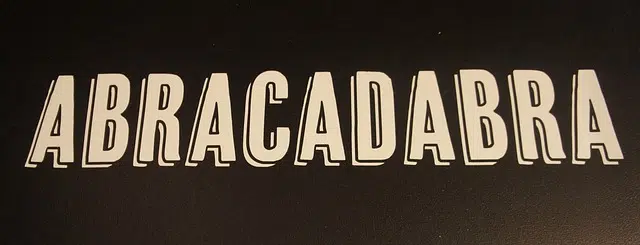
Magical powers are attributed to the term hocus pocus.
Abracadabra is a concept that comes from a late Latin word, in turn derived from the Greek abráxas . The etymology of abracadabra, therefore, leads us to the idea of abraxas .
The Gnostics (that is, the followers of the ancient religious and philosophical doctrine that combined elements of Christianity, Judaism and Eastern beliefs, holding a mysterious and intuitive knowledge of the divine) appealed to abraxas as a symbolic expression to allude to the solar course a throughout the year and represent God . This voice was also recorded on stones that were used as a talisman .
What is abracadabra
Starting from abraxas we arrived at abracadabra . It is a word to which magical powers are assigned : it is believed that its pronunciation, in this way, generates supernatural or fantastic effects.
The first recorded use of abracadabra appears in a book by Serenus Sammonicus , a Roman physician and poet who lived between the end of the 2nd century and the beginning of the 3rd century . According to this scholar, sufferers of malaria and other lethal conditions were required to wear an amulet with this message written in a triangular design.
Various groups and sects, such as the aforementioned Gnostics, continued to use this notion. Over time , most people stopped thinking that abracadabra had a mystical power and so the term acquired a different use.

Illusionists often say "abracadabra" when performing a trick.
Central element of illusionism
Abracadabra is used in the field of illusionism to carry out the supposed magical spell or ritual . It is important to keep in mind that, in this case, the illusionist does not really believe or claim that he is performing a supernatural act, but rather that his performance is part of a stage show .
Illusionism, then, is an art that consists of causing phenomena that, in appearance, contradict or ignore the laws of physics or the principles of reason . While the illusionist is responsible for hiding the mechanisms that mask the true facts, the public accepts the game without refuting the actions.
Returning to the definition of abracadabra, it is common for the illusionist, when performing the incantation , spell or spell, to say "abracadabra" . In an artistic show of this type, a representation is staged where it is made to believe that the pronunciation of the concept effects or establishes the magic .
Suppose a magician claims that he will extract a rabbit from a gallery that appears to be empty. After waving a wand in the air, he touches the galley with his staff and pronounces: “Abracadabra!” . Having said that, he puts his hand into the hat and pulls out the animal.
"Abracadabra" in the cinema
We can mention, finally, the existence of films known under the title "Abracadabra" . In 2017 , for example, a comedy titled in this way was released and was directed by the Spanish Pablo Berger and starred Antonio de la Torre Martín , Maribel Verdú and José Mota .
In Latin America , meanwhile, "Hocus Pocus" , a 1993 film that had Bette Midler , Sarah Jessica Parker and Kathy Najimy as protagonists, was distributed under the name "Abracadabra" .
